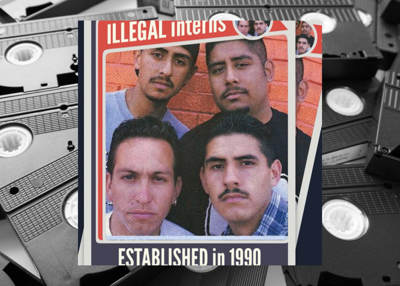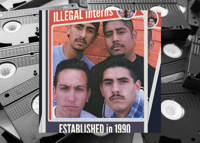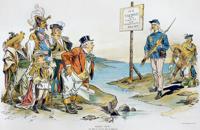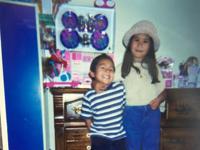
My in-laws’ small, usually tidy and sparsely furnished living room is unrecognizable.
Now, every surface is covered with the possessions that my brother-in-law Oscar Morales, his wife Sandra and their young adult sons deemed most important and would have thought to grab as they evacuated from their home in Altadena 24 hours earlier.
The last regular communication between us in the family text chain “Familia Morales Texto” was a humorous jab from Sandra telling us that the flashlight we all fought over when we played the White Elephant game on Christmas morning was lighting up their dining room. It proved to be quite the prize as they played board games to pass the time.
The windstorm, which had been described as a “life-threatening” high wind warning all week, knocked out their power in the early evening.
In Los Angeles, we all saw this warning on our phones and watched the cutesy weather reporters casually forecast windy conditions on the news, indiscriminately describing the windstorm that came on Tuesday night as dangerous, with extreme fire danger.
The following texts told us that they were being evacuated. A fire in Eaton Canyon was coming their way. They were hunkering down at a friend's house down the hill in Pasadena, stunning us with a photo of the house across the street from theirs that was on fire. The last text was from Oscar, who said he was confident that the winds would turn and that they would return home in a few hours.
My husband Flavio and I had our own home to protect from the winds that night. We live in South Pasadena, about five miles from Oscar and Sandra’s. The latches on the original windows in our 1909 home were no match for the winds that pummeled us for hours.
We sat and watched the news focus on the fire starting to rage in Pacific Palisades.
Then, they began to split their reporting between the Palisades and Eaton fires, now going equally from burning our drought-ridden mountains to homes and structures. As friends who also live in Altadena began to check in, we learned that they were all evacuated as well. We were relieved when everyone found a place to stay as they waited to hear if their homes would be okay.
The following morning, at around 7 a.m., we were awakened by our own blaring emergency evacuation warning. Flavio went to grab his phone from our office and returned, looking like someone had smacked him across the face. Oscar had just texted him.
“Our house is gone.” He wrote.
They saw their home of 20 years burning down on the news.
Walking past my in-laws' living room, we found Oscar and Sandra sitting at the dining room table. Sandra had her laptop open in front of her. She was trying to be one of the first to apply for help from F.E.M.A. She was worried the battery would die soon. The charging cable was not in front of her mind when they left the house. The black and white photos of her parents' wedding on the table behind her, were.
Oscar, a typically stoic and emotionally reserved fellow, gave us a sad half-smile and bowed his head. Trying to hide the pain of the insurmountable loss.
Oscar, who has devoted his life to providing a home for his family, began his career in media as a member of the “Illegal Interns,” a television show Flavio and their friend Richard created over 30 years ago.
The music variety show began as a public access program that ran out of Buenavision Cable in East Los Angeles, then found a home on KJLA Channel 57. Together, they created their version of a local Latino MTV into a pioneering, bilingual, bicultural television program covering everything from the 1990s popular L.A. Rave parties to the thriving Chicano/Latino music and art scene. Flavio and Richard hosted the show. Oscar was behind-the-scenes, directing throughout its 13-year run.
I met the Illegal Interns in 1993 outside of the Hollywood Palladium after a concert by Mexican rock en español pioneers Caifanes and La Maldita Vecindad. They had documented this milestone gig as these bands forged their way into making a name for themselves in the States. The “Illegal Interns” would be there to record many more notable L.A. music moments.
Their cameras went on to capture Beck’s first performances at Troy Café in Little Tokyo and Rage Against the Machine at singer Zach De La Rocha’s gallery Regeneración in Highland Park. Other Grammy-winning L.A. bands like Ozomatli and Quetzal, friends of the “Illegal Interns,” had their television debuts on their show.
By 1995, they had gained popularity as what we would now call content creators and influencers by being authentically themselves, showing their viewers a side of Los Angeles that pushed them to live in the shadows.
The audience for the show grew steadily. The Interns began to receive invitations to cover mainstream events. One of the first and most memorable was the red carpet premiere of “Mi Familia,” the movie featured rising star Jennifer Lopez. By this point, Efrain, the third Morales brother, had joined the crew, adding even more excitement to the mix. Oscar worked the camera, capturing the iconic moment when a young Flavio, doing his best to keep his cool, interviewed Jennifer, his microphone pointed as close as he could to her glowing face.
Decades ahead of their time, everything they did was shared with their audience minus the digital footprint. Artists from every medium found their home on the “Illegal Interns.”
What started as a grassroots TV show for their own enjoyment became a groundbreaking L.A. arts and culture phenomenon, shaping trends and challenging the status quo. It was a redefining platform of artistic expression east of the LA River and beyond.
Before flash drives and the Cloud, our history and memories were collected on tapes and film. Each of the interns had their own collection of tapes. Oscar was the main keeper of many of the tapes that held the “Illegal Interns” collective recorded history.
Last summer the Interns came together as seen on Richard's Instagram account, to start compiling hundreds of tapes to donate to the UCLA Film and Television Department. The countless number of tapes were to be digitized and archived for generations of future TV producers and academics to reference as part of Los Angeles pop culture in the 1990s to early 2000s. Those priceless tapes held episodes, like the ones with the moments I mentioned, that uniquely recorded L.A. alternative culture and those more nuanced with artists that would never get airtime on any mainstream program are a part of L.A. history.
Oscar’s archives were stored in his garage in Altadena.
They were not the first thing that came to mind when hearing that his home was now ashes. The years of “Illegal Interns” footage became part of the unbelievable grief of a 20-year-old home movie of love and laughter that cannot be erased. A waterfall of memories I wish could have saved their home.
It is now up to us who were fortunate enough to spend a moment in Oscar and Sandra’s home and lucky enough to have watched an episode of the “Illegal Interns” to share and document our memories, for those who did not have the privilege to do so. Their home was not only where they hung up their family photos and stored boxes of tapes with the history of some audacious Chicanos who started a TV show about their lives coming of age in L.A. It was also the home of their memories that will live on no matter the fire.











(0) comments
Welcome to the discussion.
Log In
Keep it Clean. Please avoid obscene, vulgar, lewd, racist or sexually-oriented language.
PLEASE TURN OFF YOUR CAPS LOCK.
Don't Threaten. Threats of harming another person will not be tolerated.
Be Truthful. Don't knowingly lie about anyone or anything.
Be Nice. No racism, sexism or any sort of -ism that is degrading to another person.
Be Proactive. Use the 'Report' link on each comment to let us know of abusive posts.
Share with Us. We'd love to hear eyewitness accounts, the history behind an article.